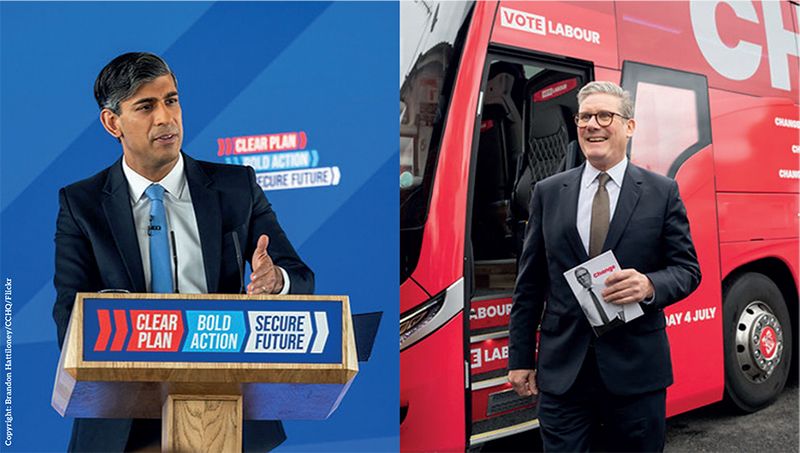Industry experts have been reacting to the policies on sustainability within party manifestos ahead of the general election on 4 July, with sustainable investing seeming to be a key point of differentiation.
While the current Conservative government has appeared to have reigned back sustainability commitments in recent months, and its manifesto remains relatively quiet on the ESG front, experts are more positive about the policies in the Labour Party’s manifesto, which proposes a mandate to accelerate UK financial institutions to align with the 1.5°C goal of the Paris Agreement among other measures.
Planet Mark’s director of policy and partnerships, Andrew Griffiths, said: “It’s great to see the Labour manifesto highlight renewable energy, nature restoration and net zero are an opportunity for the UK economy, not a burden. From a purely policy perspective, the manifesto demonstrates far greater ambition and clarity on their commitments to advance our net zero and clean energy transition.
“Additionally, the reversal of damaging policies implemented by the current government that placed restrictions on the Bank of England being able to consider climate change in its mandates is welcome, as it allows the experts to progress without having one hand tied behind their back.”
Likewise, James Alexander, CEO of the UK Sustainable Investment Forum (UKSIF), commented: “We welcome the Labour Party’s commitment to green investment in the UK. It is essential the government works closely with the private sector to unlock the huge sums of investment waiting in the wings. As we stand now, a lack of clarity and certainty on the long-term strategy for the automotive sector, for example, is destroying investor confidence, driving much-needed private capital overseas and limiting necessary progress on the decarbonisation of the transport sector.”
In contrast, Griffiths said although the Conservative manifesto brings forward some welcome policies for tripling offshore wind power, cutting grid connection times and investing in nuclear power, its overall policy messaging “continues to treat net zero as if it is a cost the UK economy must bear” and not an investment opportunity to be seized for a cleaner, healthier and more prosperous society.
National Wealth Fund
Paul Hamalainen, director of ForvisMazars’ regulatory advisory group, agreed: “Labour’s announcement about making the UK the green finance capital of the world is a welcome statement and will hopefully build on the previous government’s Green Finance Strategy.
“In an already crowded field of policy and regulation, a clear pathway that incentivises capital to find its way to UK-based purposeful impact projects is needed and would certainly start shifting the sustainability dial.”
Meanwhile, Hamalainen picked up on Labour’s plan to establish a National Wealth Fund, arguing any future government should emulate the US and introduce a bill such as the Inflation Reduction Act (IRA) to accelerate the transition to a clean energy economy.
“Green investment and growth requires blended funding and the UK has a renowned financial centre that can channel the much-needed private capital required alongside the public sector incentives,” asserted Hamalainen.
“Labour’s plan to establish a National Wealth Fund with a remit to support their clean energy missions appears to be one such move. The fund will have a target of attracting three pounds of private investment for every one pound of public investment.”
UKSIF’s Alexander also noted the effectiveness of crowding in private investment via tactical deployments of public investment, as the IRA in the US does, but warned creating the correct policy and environment for investments to thrive is also crucial.
Missed opportunities
However, all parties missed some clear opportunities. According to Griffiths, what’s omitted from both manifestos is a clear commitment to support businesses, particularly SMEs, on their net-zero journeys.
“Initiatives through grants and tax incentives could be used to massively accelerate and support British businesses to reduce the costs of investing in energy efficiency measures, on-site renewable energy generation and innovation in materials and manufacturing,” added Griffiths.
“This feels like a missed opportunity, as accelerating business investment into these things will ultimately bring down the costs for everyone, by helping bring efficiencies of scale, availability and technological advancement.”








